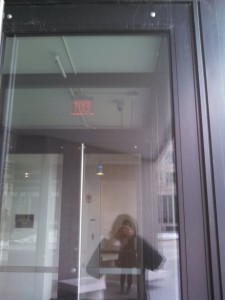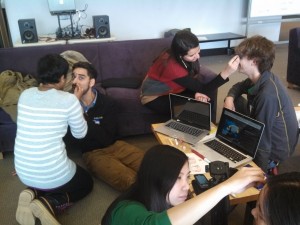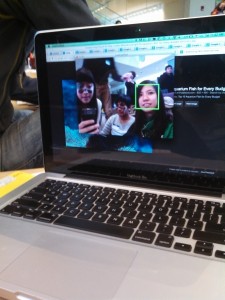Daniel: The discotech was an interesting experience for learning about surveillance and counter surveillance activism. Through talking with the numerous attendees there, I came out with a fresh perspective on how to approach social issues and think about these problems, such as surveillance, with a more critical and analytical mindset. I thought it was also interesting to see numerous artists who were there, also accomplished with their various social projects they are currently undertaking. During the hands on workshop, I especially found the analytical workshop for threatmodeling and the facepainting very informative. The face painting demo demonstrated the far reaches of technology, and how advanced facial recognition technology currently is. I believe the experience I gained at the DiscoTech will definitely allow me to be more aware of surveillance issues in the future.
Our workshop differed slightly from our original goals, in that it switched to more of a group discussion rather than a scenario hands-on activity. However, the information we gained was also incredibly valuable. We need to find out who exactly is the target audience of the UYC, in order to better understand how to frame our project. Ultimately, we should aim to capture both sides of the story in the schools in order to better allow student stories’ to be told.
Nushelle: I especially enjoyed
Saul Tannenbaum‘s short talk on the surveillance
of MIT – it really brought home the face that surveillance is a lot closer than you think, and that often the reasons why you might be under surveillance are out of your control, and may sometimes have much more to do with chance connections.
I also found the face-painting workshop to be surprisingly educational (in addition, of course, to being a lot of fun!). I admit that while I was excited about the face-painting, I wasn’t sure it would ‘work’. I think the beauty of it was that although we came in without a lot of knowledge as to how to get it done, we had such enthusiastic volunteers (
Elizabeth H Cho offered her face to be experimented on first, and Bilal suggested we use Open CV to check our success rate) that the workshop grew organically. We realised that it wasn’t about the binary of whether one fooled the camera or not, but rather about the extent to which we could reduce the camera’s ability to detect a face. Elizabeth managed to fool the camera almost entirely, and we found that unusual hairstyles or accessories like scarves helped as well.
Apart from the great discussion we had about our project, Sasha also suggested that we work with UYC to create user stories to help us narrow down who are target audience is going to be, as nailing this down early will ensure we’re all on the same page, and will influence the content, form, aesthetics, and style of the final product. Basically, it’s a sentence of who (student/parent/teacher/local councillor/etc), what (what do they want to do) and why (why do they want to use the product?). Creating several of these stories, and then picking one, or at least ranking the order of importance of these users, helps clarify who we envision benefiting from the product.
E.g. As a student, I want to record my side of the story so that I can change how we are perceived.
We hope to discuss possible user stories with Maria tomorrow.
Elizabeth: I found this DiscoTech to be a great experience to learn and interact with people. A student from a small liberal arts college, I am more accustomed to discussing and learning with people my age with a single professor or lecturer present, so it was quite a new but exciting experience for me to engage in discussions and hands-on activities with people who are already in fields I might be interested in.
To begin, during our short talks our group immediately had a couple of responses from others on punitive practices in schools. One attendee suggested we look into the history of juvenile discipline, while another suggested we compare the ways in which student safety is executed in suburban schools as opposed to urban schools. I then participated, or rather listened in, on the “Surveillance and Public Art” DIY talk. People discussed some of their projects and ideas, like USB drops and surveillance camera- recorded plays. I find public art to be such a strong platform to generate consciousness on surveillance, and I hope to hear and even participate more with it.
As Nushelle mentioned, our anti-face recognition was an unexpected hit. It was fun to discuss surveillance and face recognition software through an activity as simple as face-painting, we even got to talk and facepaint with a young girl (her mom also commented how nice it was to see lots of “girls” at the event!) Finally, we talked to Terry of Intelligent Mischief about storytelling methods, which I found very useful. I’m excited to use what we learned in our project.





